ACC717 Assignment 1: Ethical Regulations and Legal Provisions Essay
VerifiedAdded on 2022/10/19
|11
|3162
|12
Essay
AI Summary
This essay analyzes the ethical regulations and legal provisions that govern professional communicators and their impact on public interest. It explores the obligations of communicators to adhere to ethical codes, relevant laws, and contractual terms, emphasizing the importance of honesty, fairness, and client confidentiality. The essay discusses the Society of Professional Journalists (SPJ) code of ethics and ethical considerations in the news business, advertising, and public relations. It examines landmark legal cases, such as Cox Broadcasting Corp. v. Cohn and Smith v. Daily Mail, highlighting the complexities of media law and the balance between freedom of the press and individual privacy. The essay underscores the significance of ethical principles and professional codes in guiding communicators to act responsibly and consider the public good. It further highlights the importance of truthfulness, transparency, and the avoidance of conflicts of interest in professional practices, emphasizing the need for communicators to act in the public interest.
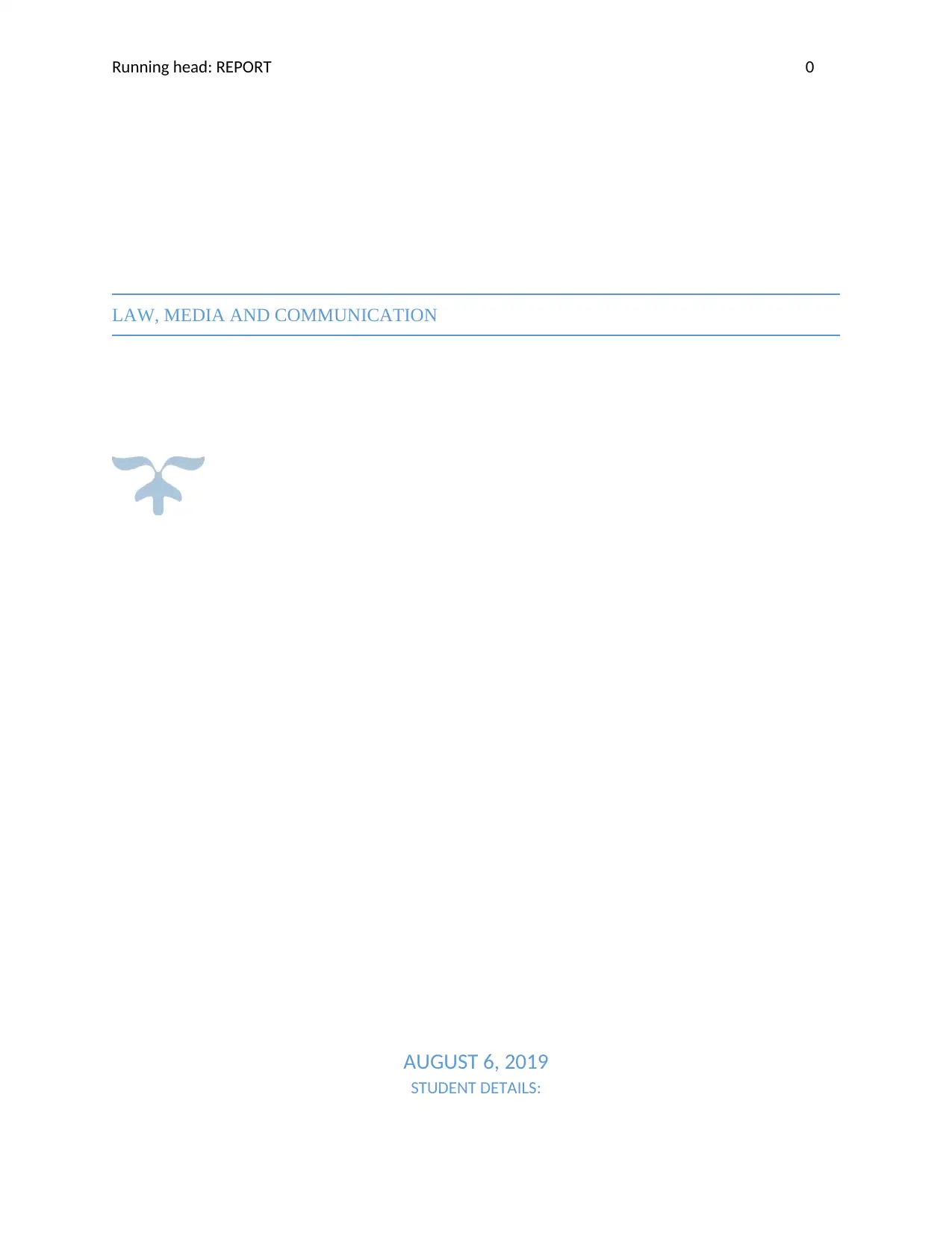
Running head: REPORT 0
LAW, MEDIA AND COMMUNICATION
AUGUST 6, 2019
STUDENT DETAILS:
LAW, MEDIA AND COMMUNICATION
AUGUST 6, 2019
STUDENT DETAILS:
Paraphrase This Document
Need a fresh take? Get an instant paraphrase of this document with our AI Paraphraser
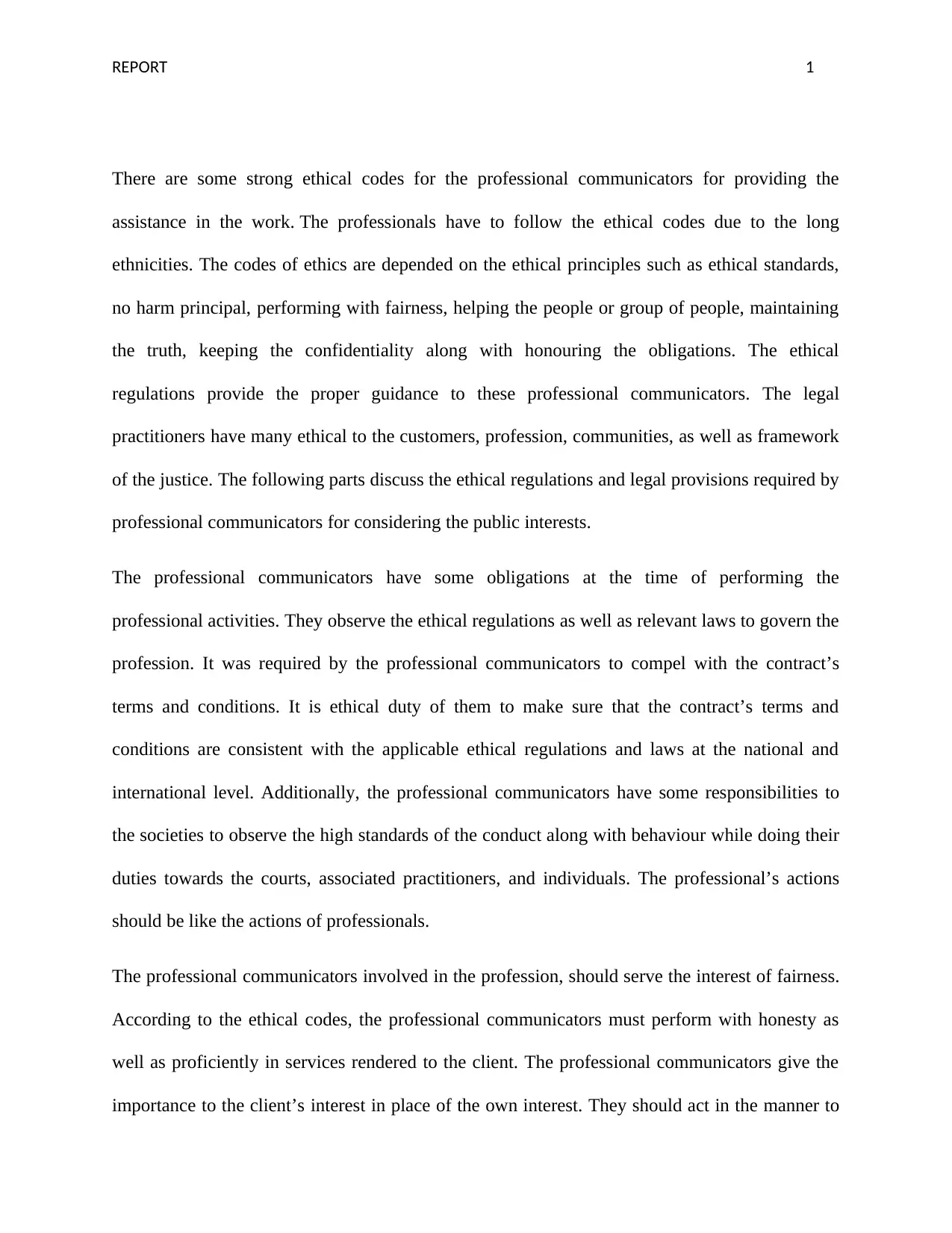
REPORT 1
There are some strong ethical codes for the professional communicators for providing the
assistance in the work. The professionals have to follow the ethical codes due to the long
ethnicities. The codes of ethics are depended on the ethical principles such as ethical standards,
no harm principal, performing with fairness, helping the people or group of people, maintaining
the truth, keeping the confidentiality along with honouring the obligations. The ethical
regulations provide the proper guidance to these professional communicators. The legal
practitioners have many ethical to the customers, profession, communities, as well as framework
of the justice. The following parts discuss the ethical regulations and legal provisions required by
professional communicators for considering the public interests.
The professional communicators have some obligations at the time of performing the
professional activities. They observe the ethical regulations as well as relevant laws to govern the
profession. It was required by the professional communicators to compel with the contract’s
terms and conditions. It is ethical duty of them to make sure that the contract’s terms and
conditions are consistent with the applicable ethical regulations and laws at the national and
international level. Additionally, the professional communicators have some responsibilities to
the societies to observe the high standards of the conduct along with behaviour while doing their
duties towards the courts, associated practitioners, and individuals. The professional’s actions
should be like the actions of professionals.
The professional communicators involved in the profession, should serve the interest of fairness.
According to the ethical codes, the professional communicators must perform with honesty as
well as proficiently in services rendered to the client. The professional communicators give the
importance to the client’s interest in place of the own interest. They should act in the manner to
There are some strong ethical codes for the professional communicators for providing the
assistance in the work. The professionals have to follow the ethical codes due to the long
ethnicities. The codes of ethics are depended on the ethical principles such as ethical standards,
no harm principal, performing with fairness, helping the people or group of people, maintaining
the truth, keeping the confidentiality along with honouring the obligations. The ethical
regulations provide the proper guidance to these professional communicators. The legal
practitioners have many ethical to the customers, profession, communities, as well as framework
of the justice. The following parts discuss the ethical regulations and legal provisions required by
professional communicators for considering the public interests.
The professional communicators have some obligations at the time of performing the
professional activities. They observe the ethical regulations as well as relevant laws to govern the
profession. It was required by the professional communicators to compel with the contract’s
terms and conditions. It is ethical duty of them to make sure that the contract’s terms and
conditions are consistent with the applicable ethical regulations and laws at the national and
international level. Additionally, the professional communicators have some responsibilities to
the societies to observe the high standards of the conduct along with behaviour while doing their
duties towards the courts, associated practitioners, and individuals. The professional’s actions
should be like the actions of professionals.
The professional communicators involved in the profession, should serve the interest of fairness.
According to the ethical codes, the professional communicators must perform with honesty as
well as proficiently in services rendered to the client. The professional communicators give the
importance to the client’s interest in place of the own interest. They should act in the manner to
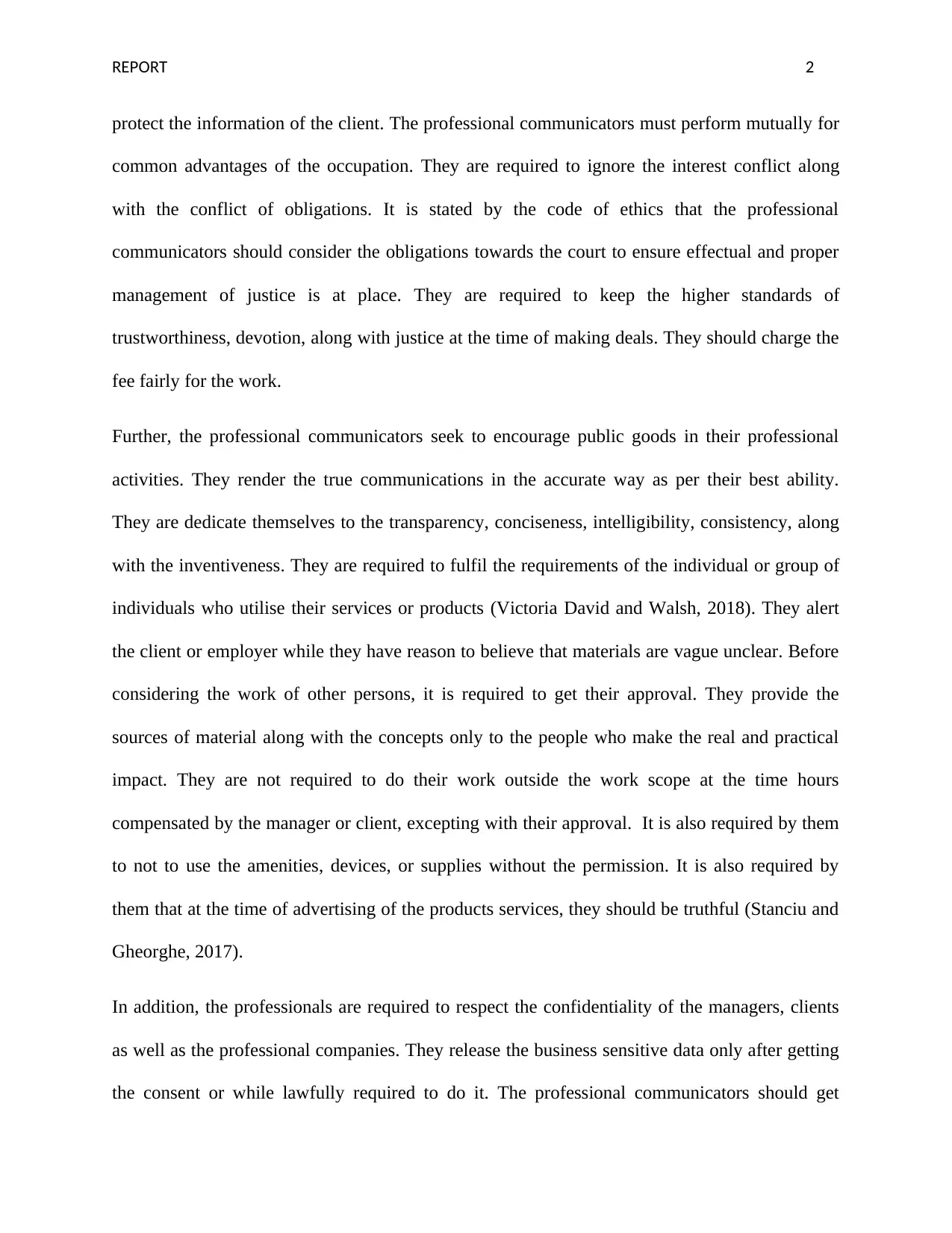
REPORT 2
protect the information of the client. The professional communicators must perform mutually for
common advantages of the occupation. They are required to ignore the interest conflict along
with the conflict of obligations. It is stated by the code of ethics that the professional
communicators should consider the obligations towards the court to ensure effectual and proper
management of justice is at place. They are required to keep the higher standards of
trustworthiness, devotion, along with justice at the time of making deals. They should charge the
fee fairly for the work.
Further, the professional communicators seek to encourage public goods in their professional
activities. They render the true communications in the accurate way as per their best ability.
They are dedicate themselves to the transparency, conciseness, intelligibility, consistency, along
with the inventiveness. They are required to fulfil the requirements of the individual or group of
individuals who utilise their services or products (Victoria David and Walsh, 2018). They alert
the client or employer while they have reason to believe that materials are vague unclear. Before
considering the work of other persons, it is required to get their approval. They provide the
sources of material along with the concepts only to the people who make the real and practical
impact. They are not required to do their work outside the work scope at the time hours
compensated by the manager or client, excepting with their approval. It is also required by them
to not to use the amenities, devices, or supplies without the permission. It is also required by
them that at the time of advertising of the products services, they should be truthful (Stanciu and
Gheorghe, 2017).
In addition, the professionals are required to respect the confidentiality of the managers, clients
as well as the professional companies. They release the business sensitive data only after getting
the consent or while lawfully required to do it. The professional communicators should get
protect the information of the client. The professional communicators must perform mutually for
common advantages of the occupation. They are required to ignore the interest conflict along
with the conflict of obligations. It is stated by the code of ethics that the professional
communicators should consider the obligations towards the court to ensure effectual and proper
management of justice is at place. They are required to keep the higher standards of
trustworthiness, devotion, along with justice at the time of making deals. They should charge the
fee fairly for the work.
Further, the professional communicators seek to encourage public goods in their professional
activities. They render the true communications in the accurate way as per their best ability.
They are dedicate themselves to the transparency, conciseness, intelligibility, consistency, along
with the inventiveness. They are required to fulfil the requirements of the individual or group of
individuals who utilise their services or products (Victoria David and Walsh, 2018). They alert
the client or employer while they have reason to believe that materials are vague unclear. Before
considering the work of other persons, it is required to get their approval. They provide the
sources of material along with the concepts only to the people who make the real and practical
impact. They are not required to do their work outside the work scope at the time hours
compensated by the manager or client, excepting with their approval. It is also required by them
to not to use the amenities, devices, or supplies without the permission. It is also required by
them that at the time of advertising of the products services, they should be truthful (Stanciu and
Gheorghe, 2017).
In addition, the professionals are required to respect the confidentiality of the managers, clients
as well as the professional companies. They release the business sensitive data only after getting
the consent or while lawfully required to do it. The professional communicators should get
⊘ This is a preview!⊘
Do you want full access?
Subscribe today to unlock all pages.

Trusted by 1+ million students worldwide
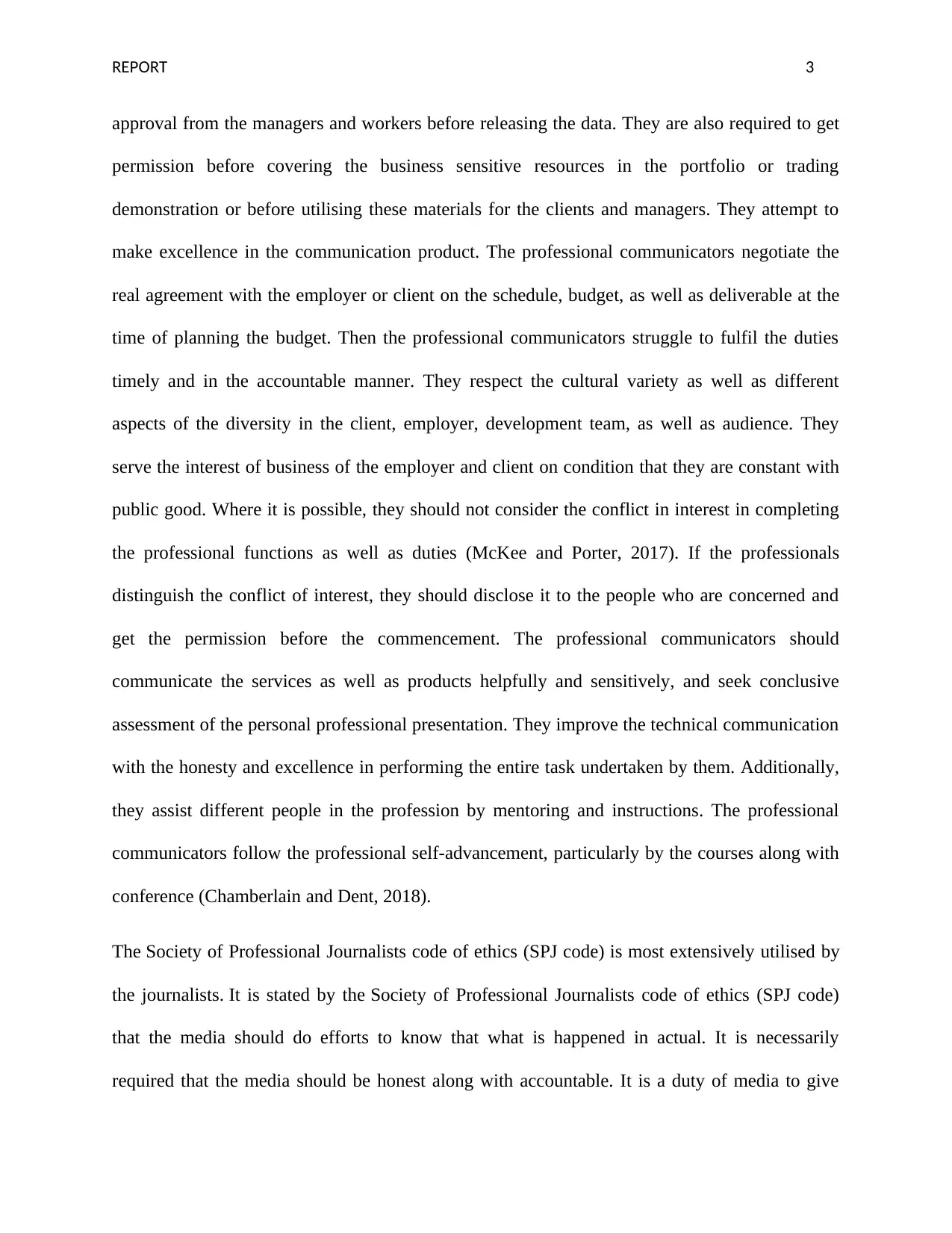
REPORT 3
approval from the managers and workers before releasing the data. They are also required to get
permission before covering the business sensitive resources in the portfolio or trading
demonstration or before utilising these materials for the clients and managers. They attempt to
make excellence in the communication product. The professional communicators negotiate the
real agreement with the employer or client on the schedule, budget, as well as deliverable at the
time of planning the budget. Then the professional communicators struggle to fulfil the duties
timely and in the accountable manner. They respect the cultural variety as well as different
aspects of the diversity in the client, employer, development team, as well as audience. They
serve the interest of business of the employer and client on condition that they are constant with
public good. Where it is possible, they should not consider the conflict in interest in completing
the professional functions as well as duties (McKee and Porter, 2017). If the professionals
distinguish the conflict of interest, they should disclose it to the people who are concerned and
get the permission before the commencement. The professional communicators should
communicate the services as well as products helpfully and sensitively, and seek conclusive
assessment of the personal professional presentation. They improve the technical communication
with the honesty and excellence in performing the entire task undertaken by them. Additionally,
they assist different people in the profession by mentoring and instructions. The professional
communicators follow the professional self-advancement, particularly by the courses along with
conference (Chamberlain and Dent, 2018).
The Society of Professional Journalists code of ethics (SPJ code) is most extensively utilised by
the journalists. It is stated by the Society of Professional Journalists code of ethics (SPJ code)
that the media should do efforts to know that what is happened in actual. It is necessarily
required that the media should be honest along with accountable. It is a duty of media to give
approval from the managers and workers before releasing the data. They are also required to get
permission before covering the business sensitive resources in the portfolio or trading
demonstration or before utilising these materials for the clients and managers. They attempt to
make excellence in the communication product. The professional communicators negotiate the
real agreement with the employer or client on the schedule, budget, as well as deliverable at the
time of planning the budget. Then the professional communicators struggle to fulfil the duties
timely and in the accountable manner. They respect the cultural variety as well as different
aspects of the diversity in the client, employer, development team, as well as audience. They
serve the interest of business of the employer and client on condition that they are constant with
public good. Where it is possible, they should not consider the conflict in interest in completing
the professional functions as well as duties (McKee and Porter, 2017). If the professionals
distinguish the conflict of interest, they should disclose it to the people who are concerned and
get the permission before the commencement. The professional communicators should
communicate the services as well as products helpfully and sensitively, and seek conclusive
assessment of the personal professional presentation. They improve the technical communication
with the honesty and excellence in performing the entire task undertaken by them. Additionally,
they assist different people in the profession by mentoring and instructions. The professional
communicators follow the professional self-advancement, particularly by the courses along with
conference (Chamberlain and Dent, 2018).
The Society of Professional Journalists code of ethics (SPJ code) is most extensively utilised by
the journalists. It is stated by the Society of Professional Journalists code of ethics (SPJ code)
that the media should do efforts to know that what is happened in actual. It is necessarily
required that the media should be honest along with accountable. It is a duty of media to give
Paraphrase This Document
Need a fresh take? Get an instant paraphrase of this document with our AI Paraphraser
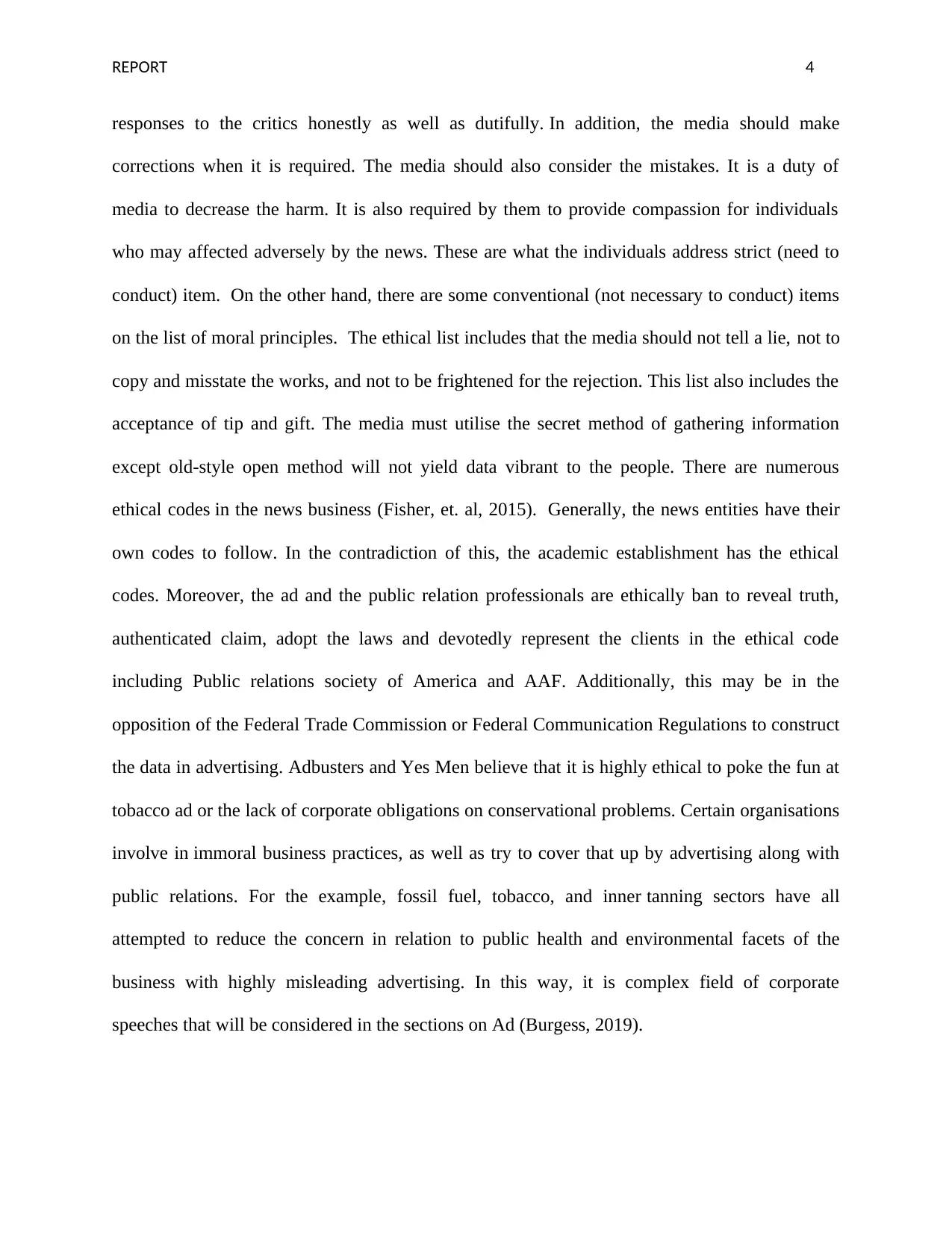
REPORT 4
responses to the critics honestly as well as dutifully. In addition, the media should make
corrections when it is required. The media should also consider the mistakes. It is a duty of
media to decrease the harm. It is also required by them to provide compassion for individuals
who may affected adversely by the news. These are what the individuals address strict (need to
conduct) item. On the other hand, there are some conventional (not necessary to conduct) items
on the list of moral principles. The ethical list includes that the media should not tell a lie, not to
copy and misstate the works, and not to be frightened for the rejection. This list also includes the
acceptance of tip and gift. The media must utilise the secret method of gathering information
except old-style open method will not yield data vibrant to the people. There are numerous
ethical codes in the news business (Fisher, et. al, 2015). Generally, the news entities have their
own codes to follow. In the contradiction of this, the academic establishment has the ethical
codes. Moreover, the ad and the public relation professionals are ethically ban to reveal truth,
authenticated claim, adopt the laws and devotedly represent the clients in the ethical code
including Public relations society of America and AAF. Additionally, this may be in the
opposition of the Federal Trade Commission or Federal Communication Regulations to construct
the data in advertising. Adbusters and Yes Men believe that it is highly ethical to poke the fun at
tobacco ad or the lack of corporate obligations on conservational problems. Certain organisations
involve in immoral business practices, as well as try to cover that up by advertising along with
public relations. For the example, fossil fuel, tobacco, and inner tanning sectors have all
attempted to reduce the concern in relation to public health and environmental facets of the
business with highly misleading advertising. In this way, it is complex field of corporate
speeches that will be considered in the sections on Ad (Burgess, 2019).
responses to the critics honestly as well as dutifully. In addition, the media should make
corrections when it is required. The media should also consider the mistakes. It is a duty of
media to decrease the harm. It is also required by them to provide compassion for individuals
who may affected adversely by the news. These are what the individuals address strict (need to
conduct) item. On the other hand, there are some conventional (not necessary to conduct) items
on the list of moral principles. The ethical list includes that the media should not tell a lie, not to
copy and misstate the works, and not to be frightened for the rejection. This list also includes the
acceptance of tip and gift. The media must utilise the secret method of gathering information
except old-style open method will not yield data vibrant to the people. There are numerous
ethical codes in the news business (Fisher, et. al, 2015). Generally, the news entities have their
own codes to follow. In the contradiction of this, the academic establishment has the ethical
codes. Moreover, the ad and the public relation professionals are ethically ban to reveal truth,
authenticated claim, adopt the laws and devotedly represent the clients in the ethical code
including Public relations society of America and AAF. Additionally, this may be in the
opposition of the Federal Trade Commission or Federal Communication Regulations to construct
the data in advertising. Adbusters and Yes Men believe that it is highly ethical to poke the fun at
tobacco ad or the lack of corporate obligations on conservational problems. Certain organisations
involve in immoral business practices, as well as try to cover that up by advertising along with
public relations. For the example, fossil fuel, tobacco, and inner tanning sectors have all
attempted to reduce the concern in relation to public health and environmental facets of the
business with highly misleading advertising. In this way, it is complex field of corporate
speeches that will be considered in the sections on Ad (Burgess, 2019).
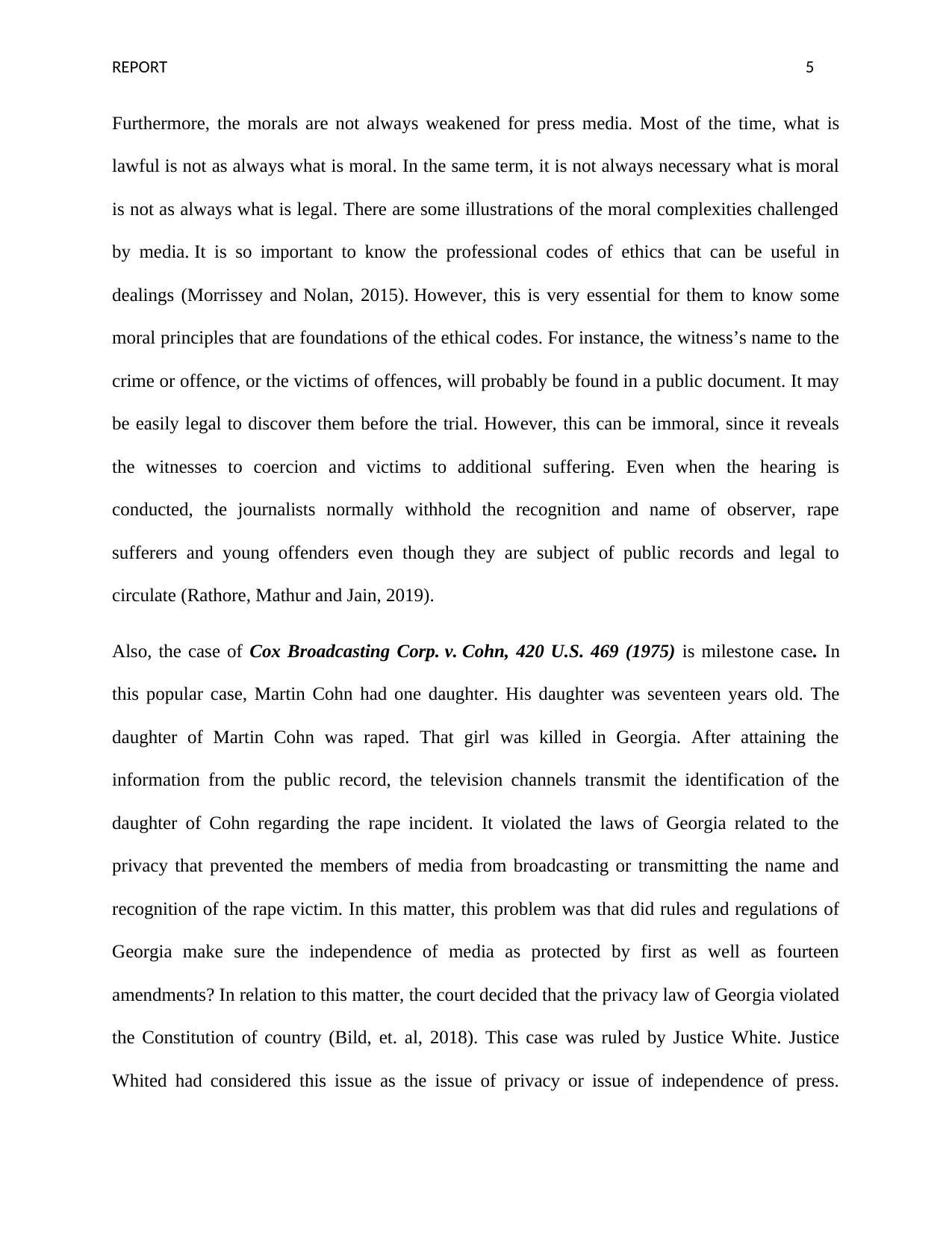
REPORT 5
Furthermore, the morals are not always weakened for press media. Most of the time, what is
lawful is not as always what is moral. In the same term, it is not always necessary what is moral
is not as always what is legal. There are some illustrations of the moral complexities challenged
by media. It is so important to know the professional codes of ethics that can be useful in
dealings (Morrissey and Nolan, 2015). However, this is very essential for them to know some
moral principles that are foundations of the ethical codes. For instance, the witness’s name to the
crime or offence, or the victims of offences, will probably be found in a public document. It may
be easily legal to discover them before the trial. However, this can be immoral, since it reveals
the witnesses to coercion and victims to additional suffering. Even when the hearing is
conducted, the journalists normally withhold the recognition and name of observer, rape
sufferers and young offenders even though they are subject of public records and legal to
circulate (Rathore, Mathur and Jain, 2019).
Also, the case of Cox Broadcasting Corp. v. Cohn, 420 U.S. 469 (1975) is milestone case. In
this popular case, Martin Cohn had one daughter. His daughter was seventeen years old. The
daughter of Martin Cohn was raped. That girl was killed in Georgia. After attaining the
information from the public record, the television channels transmit the identification of the
daughter of Cohn regarding the rape incident. It violated the laws of Georgia related to the
privacy that prevented the members of media from broadcasting or transmitting the name and
recognition of the rape victim. In this matter, this problem was that did rules and regulations of
Georgia make sure the independence of media as protected by first as well as fourteen
amendments? In relation to this matter, the court decided that the privacy law of Georgia violated
the Constitution of country (Bild, et. al, 2018). This case was ruled by Justice White. Justice
Whited had considered this issue as the issue of privacy or issue of independence of press.
Furthermore, the morals are not always weakened for press media. Most of the time, what is
lawful is not as always what is moral. In the same term, it is not always necessary what is moral
is not as always what is legal. There are some illustrations of the moral complexities challenged
by media. It is so important to know the professional codes of ethics that can be useful in
dealings (Morrissey and Nolan, 2015). However, this is very essential for them to know some
moral principles that are foundations of the ethical codes. For instance, the witness’s name to the
crime or offence, or the victims of offences, will probably be found in a public document. It may
be easily legal to discover them before the trial. However, this can be immoral, since it reveals
the witnesses to coercion and victims to additional suffering. Even when the hearing is
conducted, the journalists normally withhold the recognition and name of observer, rape
sufferers and young offenders even though they are subject of public records and legal to
circulate (Rathore, Mathur and Jain, 2019).
Also, the case of Cox Broadcasting Corp. v. Cohn, 420 U.S. 469 (1975) is milestone case. In
this popular case, Martin Cohn had one daughter. His daughter was seventeen years old. The
daughter of Martin Cohn was raped. That girl was killed in Georgia. After attaining the
information from the public record, the television channels transmit the identification of the
daughter of Cohn regarding the rape incident. It violated the laws of Georgia related to the
privacy that prevented the members of media from broadcasting or transmitting the name and
recognition of the rape victim. In this matter, this problem was that did rules and regulations of
Georgia make sure the independence of media as protected by first as well as fourteen
amendments? In relation to this matter, the court decided that the privacy law of Georgia violated
the Constitution of country (Bild, et. al, 2018). This case was ruled by Justice White. Justice
Whited had considered this issue as the issue of privacy or issue of independence of press.
⊘ This is a preview!⊘
Do you want full access?
Subscribe today to unlock all pages.

Trusted by 1+ million students worldwide
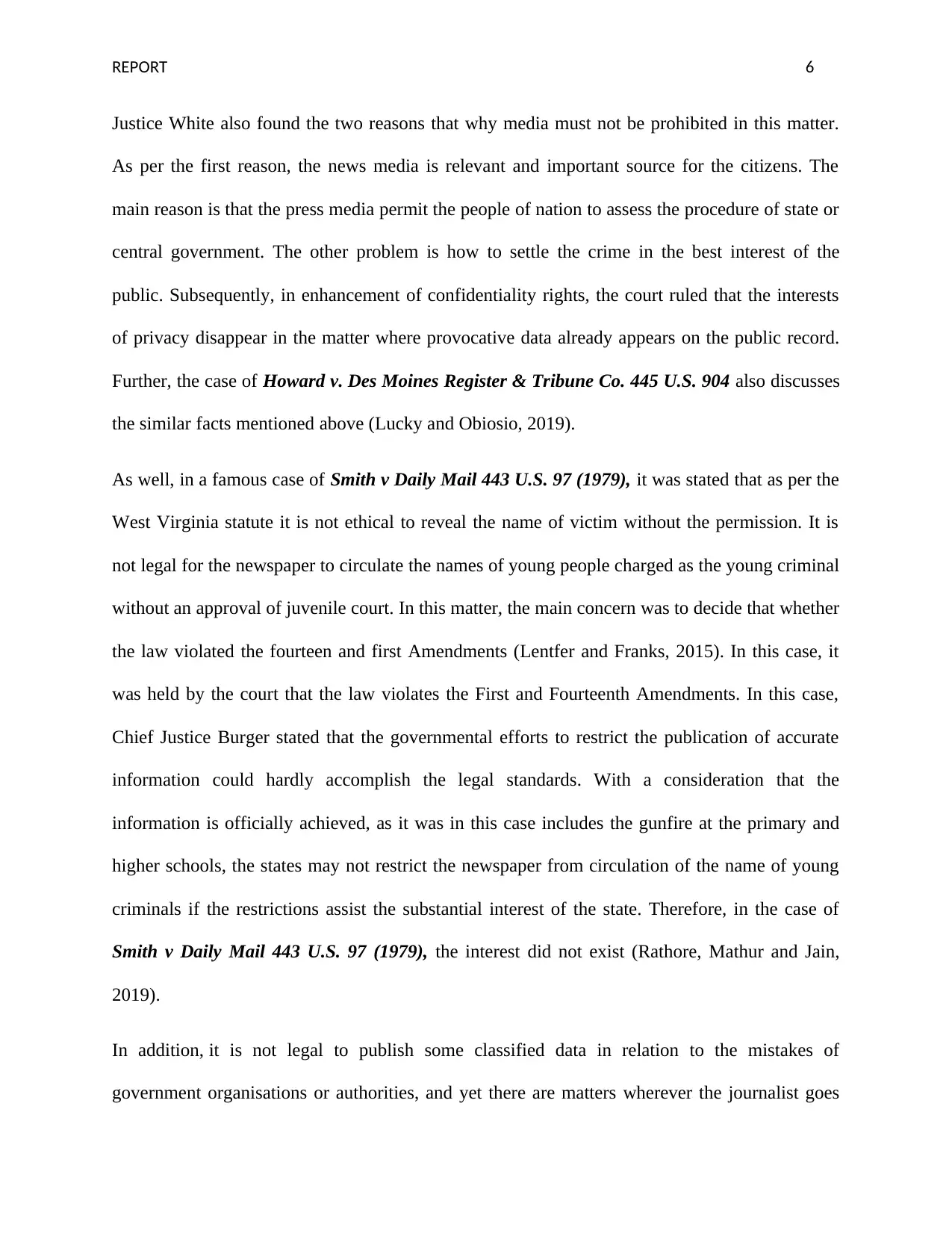
REPORT 6
Justice White also found the two reasons that why media must not be prohibited in this matter.
As per the first reason, the news media is relevant and important source for the citizens. The
main reason is that the press media permit the people of nation to assess the procedure of state or
central government. The other problem is how to settle the crime in the best interest of the
public. Subsequently, in enhancement of confidentiality rights, the court ruled that the interests
of privacy disappear in the matter where provocative data already appears on the public record.
Further, the case of Howard v. Des Moines Register & Tribune Co. 445 U.S. 904 also discusses
the similar facts mentioned above (Lucky and Obiosio, 2019).
As well, in a famous case of Smith v Daily Mail 443 U.S. 97 (1979), it was stated that as per the
West Virginia statute it is not ethical to reveal the name of victim without the permission. It is
not legal for the newspaper to circulate the names of young people charged as the young criminal
without an approval of juvenile court. In this matter, the main concern was to decide that whether
the law violated the fourteen and first Amendments (Lentfer and Franks, 2015). In this case, it
was held by the court that the law violates the First and Fourteenth Amendments. In this case,
Chief Justice Burger stated that the governmental efforts to restrict the publication of accurate
information could hardly accomplish the legal standards. With a consideration that the
information is officially achieved, as it was in this case includes the gunfire at the primary and
higher schools, the states may not restrict the newspaper from circulation of the name of young
criminals if the restrictions assist the substantial interest of the state. Therefore, in the case of
Smith v Daily Mail 443 U.S. 97 (1979), the interest did not exist (Rathore, Mathur and Jain,
2019).
In addition, it is not legal to publish some classified data in relation to the mistakes of
government organisations or authorities, and yet there are matters wherever the journalist goes
Justice White also found the two reasons that why media must not be prohibited in this matter.
As per the first reason, the news media is relevant and important source for the citizens. The
main reason is that the press media permit the people of nation to assess the procedure of state or
central government. The other problem is how to settle the crime in the best interest of the
public. Subsequently, in enhancement of confidentiality rights, the court ruled that the interests
of privacy disappear in the matter where provocative data already appears on the public record.
Further, the case of Howard v. Des Moines Register & Tribune Co. 445 U.S. 904 also discusses
the similar facts mentioned above (Lucky and Obiosio, 2019).
As well, in a famous case of Smith v Daily Mail 443 U.S. 97 (1979), it was stated that as per the
West Virginia statute it is not ethical to reveal the name of victim without the permission. It is
not legal for the newspaper to circulate the names of young people charged as the young criminal
without an approval of juvenile court. In this matter, the main concern was to decide that whether
the law violated the fourteen and first Amendments (Lentfer and Franks, 2015). In this case, it
was held by the court that the law violates the First and Fourteenth Amendments. In this case,
Chief Justice Burger stated that the governmental efforts to restrict the publication of accurate
information could hardly accomplish the legal standards. With a consideration that the
information is officially achieved, as it was in this case includes the gunfire at the primary and
higher schools, the states may not restrict the newspaper from circulation of the name of young
criminals if the restrictions assist the substantial interest of the state. Therefore, in the case of
Smith v Daily Mail 443 U.S. 97 (1979), the interest did not exist (Rathore, Mathur and Jain,
2019).
In addition, it is not legal to publish some classified data in relation to the mistakes of
government organisations or authorities, and yet there are matters wherever the journalist goes
Paraphrase This Document
Need a fresh take? Get an instant paraphrase of this document with our AI Paraphraser
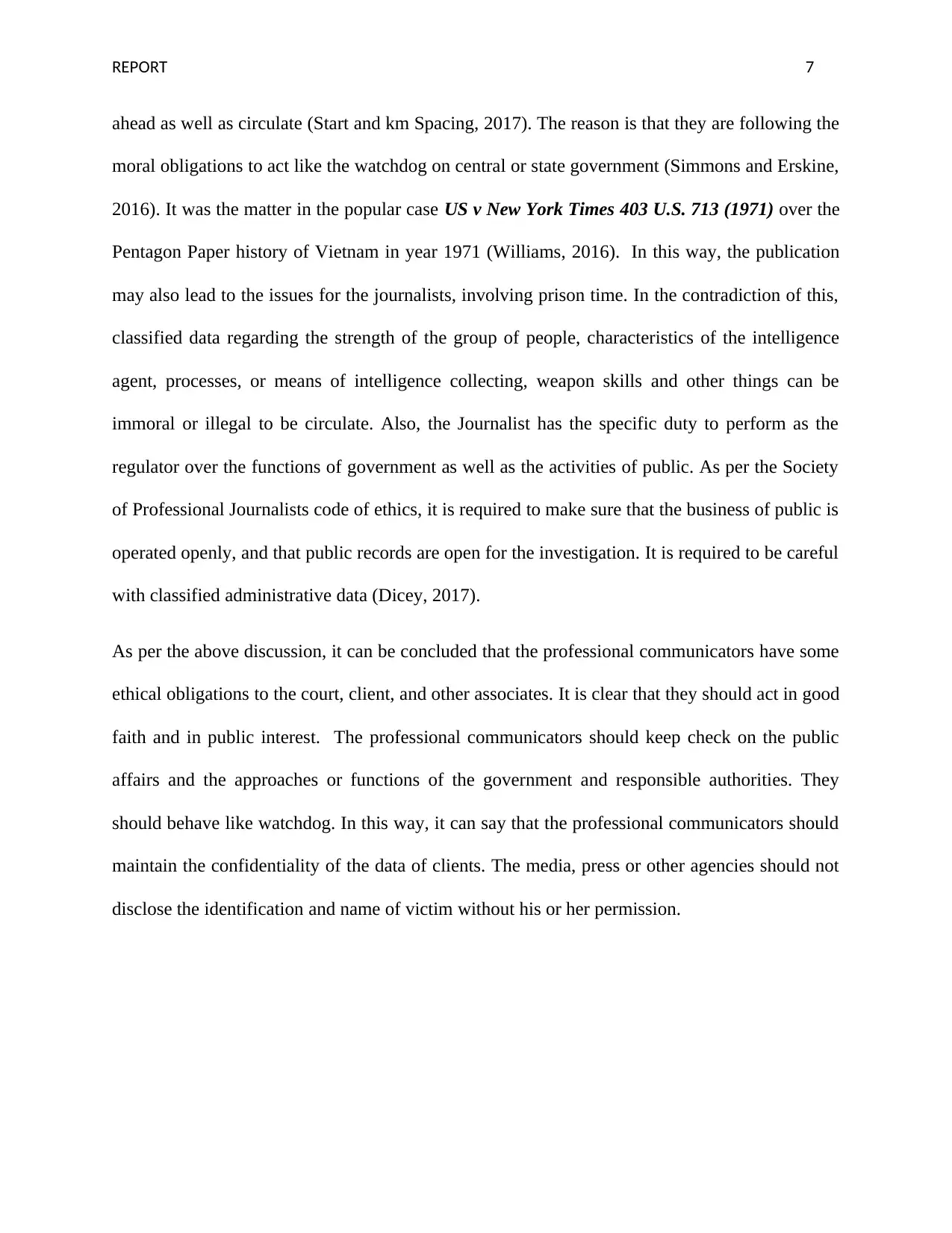
REPORT 7
ahead as well as circulate (Start and km Spacing, 2017). The reason is that they are following the
moral obligations to act like the watchdog on central or state government (Simmons and Erskine,
2016). It was the matter in the popular case US v New York Times 403 U.S. 713 (1971) over the
Pentagon Paper history of Vietnam in year 1971 (Williams, 2016). In this way, the publication
may also lead to the issues for the journalists, involving prison time. In the contradiction of this,
classified data regarding the strength of the group of people, characteristics of the intelligence
agent, processes, or means of intelligence collecting, weapon skills and other things can be
immoral or illegal to be circulate. Also, the Journalist has the specific duty to perform as the
regulator over the functions of government as well as the activities of public. As per the Society
of Professional Journalists code of ethics, it is required to make sure that the business of public is
operated openly, and that public records are open for the investigation. It is required to be careful
with classified administrative data (Dicey, 2017).
As per the above discussion, it can be concluded that the professional communicators have some
ethical obligations to the court, client, and other associates. It is clear that they should act in good
faith and in public interest. The professional communicators should keep check on the public
affairs and the approaches or functions of the government and responsible authorities. They
should behave like watchdog. In this way, it can say that the professional communicators should
maintain the confidentiality of the data of clients. The media, press or other agencies should not
disclose the identification and name of victim without his or her permission.
ahead as well as circulate (Start and km Spacing, 2017). The reason is that they are following the
moral obligations to act like the watchdog on central or state government (Simmons and Erskine,
2016). It was the matter in the popular case US v New York Times 403 U.S. 713 (1971) over the
Pentagon Paper history of Vietnam in year 1971 (Williams, 2016). In this way, the publication
may also lead to the issues for the journalists, involving prison time. In the contradiction of this,
classified data regarding the strength of the group of people, characteristics of the intelligence
agent, processes, or means of intelligence collecting, weapon skills and other things can be
immoral or illegal to be circulate. Also, the Journalist has the specific duty to perform as the
regulator over the functions of government as well as the activities of public. As per the Society
of Professional Journalists code of ethics, it is required to make sure that the business of public is
operated openly, and that public records are open for the investigation. It is required to be careful
with classified administrative data (Dicey, 2017).
As per the above discussion, it can be concluded that the professional communicators have some
ethical obligations to the court, client, and other associates. It is clear that they should act in good
faith and in public interest. The professional communicators should keep check on the public
affairs and the approaches or functions of the government and responsible authorities. They
should behave like watchdog. In this way, it can say that the professional communicators should
maintain the confidentiality of the data of clients. The media, press or other agencies should not
disclose the identification and name of victim without his or her permission.
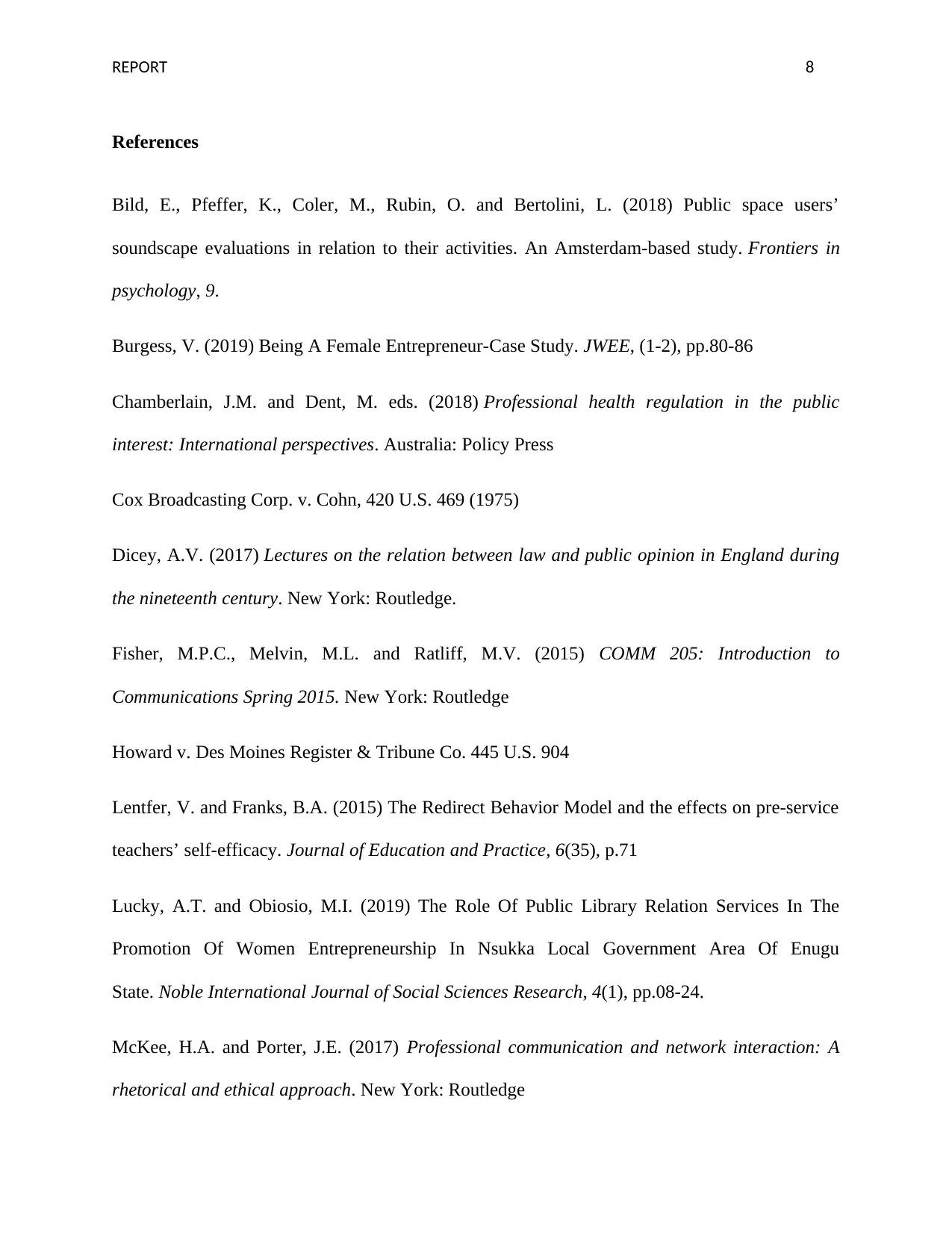
REPORT 8
References
Bild, E., Pfeffer, K., Coler, M., Rubin, O. and Bertolini, L. (2018) Public space users’
soundscape evaluations in relation to their activities. An Amsterdam-based study. Frontiers in
psychology, 9.
Burgess, V. (2019) Being A Female Entrepreneur-Case Study. JWEE, (1-2), pp.80-86
Chamberlain, J.M. and Dent, M. eds. (2018) Professional health regulation in the public
interest: International perspectives. Australia: Policy Press
Cox Broadcasting Corp. v. Cohn, 420 U.S. 469 (1975)
Dicey, A.V. (2017) Lectures on the relation between law and public opinion in England during
the nineteenth century. New York: Routledge.
Fisher, M.P.C., Melvin, M.L. and Ratliff, M.V. (2015) COMM 205: Introduction to
Communications Spring 2015. New York: Routledge
Howard v. Des Moines Register & Tribune Co. 445 U.S. 904
Lentfer, V. and Franks, B.A. (2015) The Redirect Behavior Model and the effects on pre-service
teachers’ self-efficacy. Journal of Education and Practice, 6(35), p.71
Lucky, A.T. and Obiosio, M.I. (2019) The Role Of Public Library Relation Services In The
Promotion Of Women Entrepreneurship In Nsukka Local Government Area Of Enugu
State. Noble International Journal of Social Sciences Research, 4(1), pp.08-24.
McKee, H.A. and Porter, J.E. (2017) Professional communication and network interaction: A
rhetorical and ethical approach. New York: Routledge
References
Bild, E., Pfeffer, K., Coler, M., Rubin, O. and Bertolini, L. (2018) Public space users’
soundscape evaluations in relation to their activities. An Amsterdam-based study. Frontiers in
psychology, 9.
Burgess, V. (2019) Being A Female Entrepreneur-Case Study. JWEE, (1-2), pp.80-86
Chamberlain, J.M. and Dent, M. eds. (2018) Professional health regulation in the public
interest: International perspectives. Australia: Policy Press
Cox Broadcasting Corp. v. Cohn, 420 U.S. 469 (1975)
Dicey, A.V. (2017) Lectures on the relation between law and public opinion in England during
the nineteenth century. New York: Routledge.
Fisher, M.P.C., Melvin, M.L. and Ratliff, M.V. (2015) COMM 205: Introduction to
Communications Spring 2015. New York: Routledge
Howard v. Des Moines Register & Tribune Co. 445 U.S. 904
Lentfer, V. and Franks, B.A. (2015) The Redirect Behavior Model and the effects on pre-service
teachers’ self-efficacy. Journal of Education and Practice, 6(35), p.71
Lucky, A.T. and Obiosio, M.I. (2019) The Role Of Public Library Relation Services In The
Promotion Of Women Entrepreneurship In Nsukka Local Government Area Of Enugu
State. Noble International Journal of Social Sciences Research, 4(1), pp.08-24.
McKee, H.A. and Porter, J.E. (2017) Professional communication and network interaction: A
rhetorical and ethical approach. New York: Routledge
⊘ This is a preview!⊘
Do you want full access?
Subscribe today to unlock all pages.

Trusted by 1+ million students worldwide
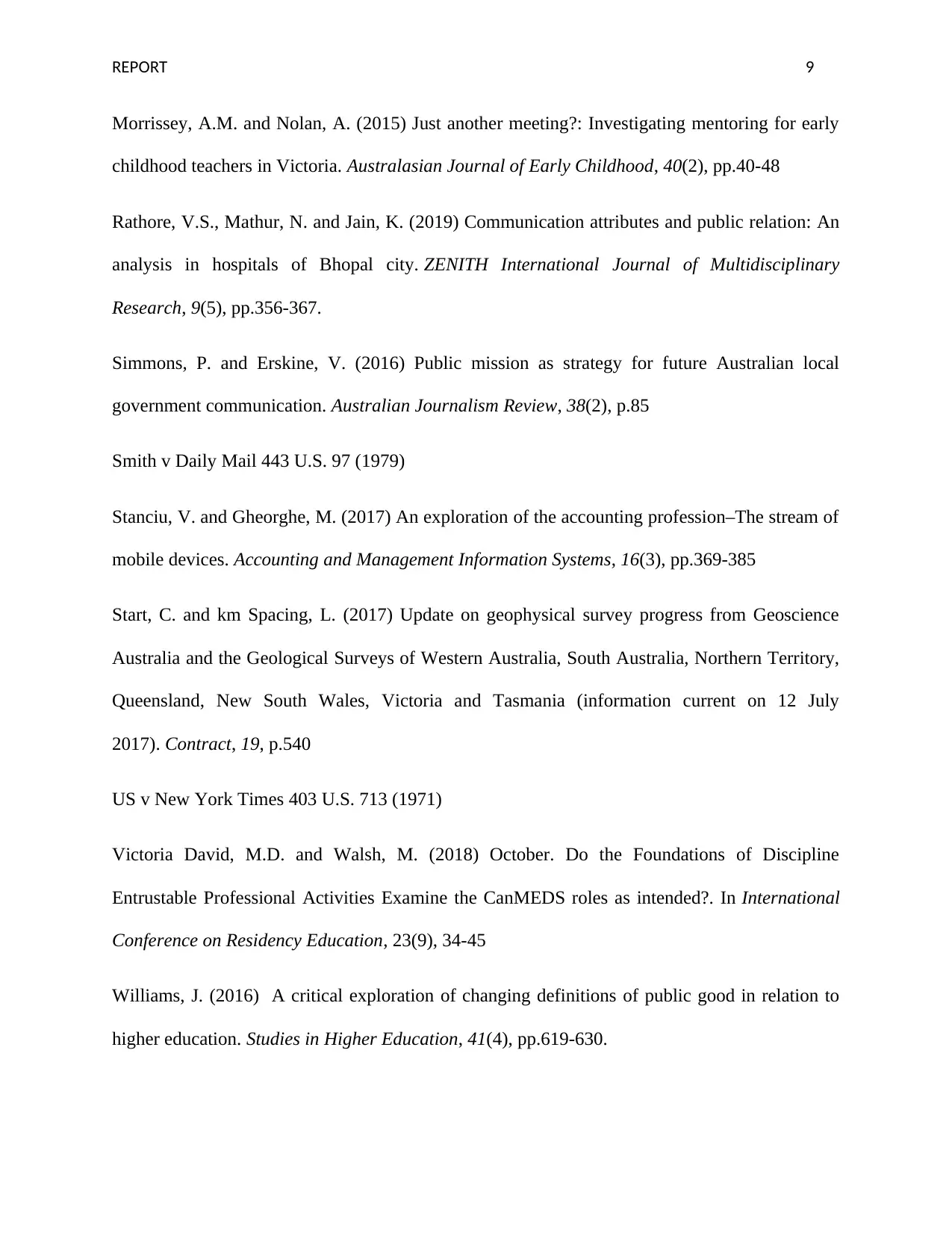
REPORT 9
Morrissey, A.M. and Nolan, A. (2015) Just another meeting?: Investigating mentoring for early
childhood teachers in Victoria. Australasian Journal of Early Childhood, 40(2), pp.40-48
Rathore, V.S., Mathur, N. and Jain, K. (2019) Communication attributes and public relation: An
analysis in hospitals of Bhopal city. ZENITH International Journal of Multidisciplinary
Research, 9(5), pp.356-367.
Simmons, P. and Erskine, V. (2016) Public mission as strategy for future Australian local
government communication. Australian Journalism Review, 38(2), p.85
Smith v Daily Mail 443 U.S. 97 (1979)
Stanciu, V. and Gheorghe, M. (2017) An exploration of the accounting profession–The stream of
mobile devices. Accounting and Management Information Systems, 16(3), pp.369-385
Start, C. and km Spacing, L. (2017) Update on geophysical survey progress from Geoscience
Australia and the Geological Surveys of Western Australia, South Australia, Northern Territory,
Queensland, New South Wales, Victoria and Tasmania (information current on 12 July
2017). Contract, 19, p.540
US v New York Times 403 U.S. 713 (1971)
Victoria David, M.D. and Walsh, M. (2018) October. Do the Foundations of Discipline
Entrustable Professional Activities Examine the CanMEDS roles as intended?. In International
Conference on Residency Education, 23(9), 34-45
Williams, J. (2016) A critical exploration of changing definitions of public good in relation to
higher education. Studies in Higher Education, 41(4), pp.619-630.
Morrissey, A.M. and Nolan, A. (2015) Just another meeting?: Investigating mentoring for early
childhood teachers in Victoria. Australasian Journal of Early Childhood, 40(2), pp.40-48
Rathore, V.S., Mathur, N. and Jain, K. (2019) Communication attributes and public relation: An
analysis in hospitals of Bhopal city. ZENITH International Journal of Multidisciplinary
Research, 9(5), pp.356-367.
Simmons, P. and Erskine, V. (2016) Public mission as strategy for future Australian local
government communication. Australian Journalism Review, 38(2), p.85
Smith v Daily Mail 443 U.S. 97 (1979)
Stanciu, V. and Gheorghe, M. (2017) An exploration of the accounting profession–The stream of
mobile devices. Accounting and Management Information Systems, 16(3), pp.369-385
Start, C. and km Spacing, L. (2017) Update on geophysical survey progress from Geoscience
Australia and the Geological Surveys of Western Australia, South Australia, Northern Territory,
Queensland, New South Wales, Victoria and Tasmania (information current on 12 July
2017). Contract, 19, p.540
US v New York Times 403 U.S. 713 (1971)
Victoria David, M.D. and Walsh, M. (2018) October. Do the Foundations of Discipline
Entrustable Professional Activities Examine the CanMEDS roles as intended?. In International
Conference on Residency Education, 23(9), 34-45
Williams, J. (2016) A critical exploration of changing definitions of public good in relation to
higher education. Studies in Higher Education, 41(4), pp.619-630.
Paraphrase This Document
Need a fresh take? Get an instant paraphrase of this document with our AI Paraphraser

REPORT 10
1 out of 11
Related Documents
Your All-in-One AI-Powered Toolkit for Academic Success.
+13062052269
info@desklib.com
Available 24*7 on WhatsApp / Email
![[object Object]](/_next/static/media/star-bottom.7253800d.svg)
Unlock your academic potential
Copyright © 2020–2026 A2Z Services. All Rights Reserved. Developed and managed by ZUCOL.





